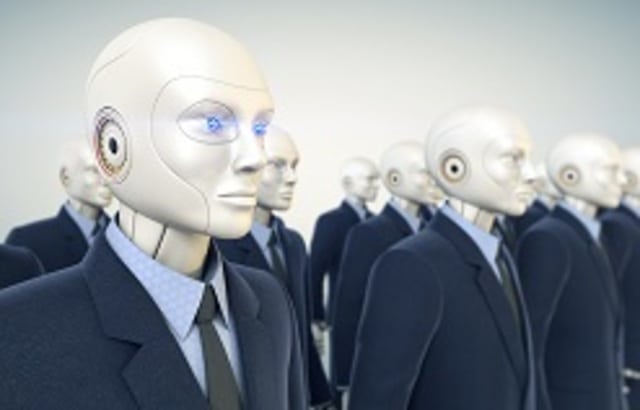For a long period time the concept of artificial intelligence (AI) and robot learning has been the stuff of science fiction. However, recent advance in technology has lead to a surge in interest in AI, robots and automations, and fund management groups have been quick to get in the game.
Earlier this month Polar Capital revealed plans to launch an automation and artificial intelligence fund, while in July Smith & Williamson unveiled a global thematic AI fund for its two incoming managers from Pictet.
So is the hype around AI justified, or should investors be wary? Josh Spencer, portfolio manager of the T Rowe Price Global Technology Equity Fund, is very much in the former camp.
“With its rapid development, AI, which involves programming machines to efficiently provide solutions, is permeating a wide range of fields, from healthcare to financial services to security,” says Spencer. “It is the kind of disruptive technology we are always looking to take advantage of as investors.”
While AI might not be manifesting itself in robots around the home just yet, it is in more places than you might expect. For example, it is embedded in more and more sophisticated mobile devices and digital personal assistants, including Amazon’s Alexa and Apple’s Siri. It also is powering enhanced search functions from Google and Baidu, Tesla’s innovation in autonomous driving and more targeted customer recommendations from Netflix and Amazon.
Spencer says: “In healthcare, AI is improving illness prevention through diagnostics and is aiding treatments and surgical procedures. Digital health assistants bridge the gaps between doctors and patients to maintain patient care. IBM’s Watson Health analyses possible cancer treatments and the company is developing a new platform for evaluating drug safety.”
As the technology required for AI becomes cheaper and more accessible, Spencer says corporations seeking greater insights from data are increasingly investing in AI. As such it is a theme he is playing within the T Rowe Price Global Technology Equity Fund
“We believe AI technology has become so impactful that companies that do not recognise the benefits or the threat of potential disruption risk being on the wrong side of change,” he argues.
Of course, the possibility of a robot uprising isn’t to everyone’s taste. Seneca’s chief investment officer Peter Elston hit the headlines earlier this year when he poised the question: is a computer going to steal my job as fund manager?
He isn’t the only one worried. A recent PwC report suggested up to 30% of UK jobs were at risk from automation, by 2030, while a number of high profile figures from Bill Gates, to Elon Musk and Stephen Hawking have also taken to the public platform to warn about the longer-term potential dangers of AI.
So where does the truth lie? Should we be fearful of the future, or embrace it?
Robert Lea, head of global equity research at Ashburton Investments, says he is more inclined to believe the latter, and expects these evolving technologies to ultimately make a positive contribution to society and the broader economy.
“While AI is adept at analysing data, the current generation of AI solutions are application specific and are only able to operate within the narrow confines of the task they were designed for,” says Lea. “For example, the Cortana digital assistant would have zero chance of being able to recognise a face from a photograph, as it was not built for that role.”
Lea is aware the critics will argue that AI does have the ability to learn. While he notes this is technically true, he says the learning ability of any AI programme is still confined to the function it was designed for.
“The term ‘learn’ is also potentially misleading, as it really describes the ability of AI networks to ‘learn’ and improve their performance through the repeated performance of the set task,” he says. “The ability of AI systems to learn outside the confines of their programmed function is extremely limited.”
In other words, Lea says AI – as it exists today – is not really very intelligent at all. So should we be worried about the rise of the machines?
Lea says: “On balance no, although rapid progress has been made in recent years, AI developments still remain at a relatively early stage. As things stand, the prospect of a sentient machine, capable of original thought and possessing an artificial consciousness remains the stuff of science fiction. This is not to suggest this will never happen, but it is not a breakthrough I expect to occur in my lifetime.
“On balance, we see the increasing use of robotic and automation as a net positive, and expect them to raise productivity in the economy, rather than replace jobs directly. In other words, the use of robotics and automation should augment labour, not substitute it.”
So who are the key players in the field that investors should be looking out for? Thomas Fitzgerald, associate fund manager at Edentree Investment Management, says it includes those companies with the core building blocks of these technologies.
This, Fitzgerald says, would namely be big data companies – such as Alphabet, Facebook and IBM – semiconductor producers and hardware manufacturers in areas such as sensors, microphones and cameras required for data collection and interpretation and cloud computing services.
“We believe that ultimately these functions will be offered to enterprises and end-users as a part of their overall cloud computing services,” he says. As such, he picks out Amazon and Microsoft as two more beneficiary companies.
So rather than trying to end our lives, Lea concludes that AI will ultimately end up enhancing people’s lives.
“We should embrace these new technologies, not fear them,” he says. ”When used appropriately, AI, robotics and automation can make a positive contribution to society and raise productivity in the economy.”










